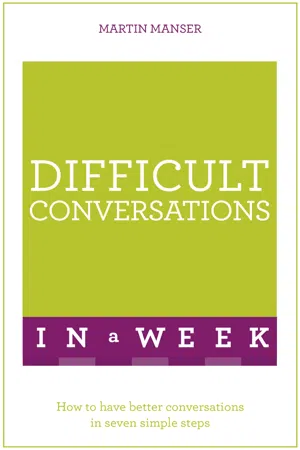
Difficult Conversations In A Week
How To Have Better Conversations In Seven Simple Steps
Martin Manser
- 128 pages
- English
- ePUB (mobile friendly)
- Available on iOS & Android
Difficult Conversations In A Week
How To Have Better Conversations In Seven Simple Steps
Martin Manser
About This Book
Difficult conversations just got easier
How do you deal professionally with a colleague whose work is seriously below standard? A supplier who is always late? Saying 'no' graciously? Giving someone bad news? Many of us have been on the receiving end of business conversations that have been badly handled, poorly timed or scarcely prepared for by the person we're talking to. This practical book offers help to new and aspiring managers in a variety of business situations, such as delivering bad news in an appraisal, and how to work with a range of colleagues who may be lazy, negative orincompetent.Whether you choose to read it in a week or in a single sitting, Difficult Conversations In A Week is your fastest route to success: - Sunday: Why are some conversations difficult? We may tend to avoid difficult conversations: how else can you deal with them?
- Monday: Manage your emotions Distinguish the facts of an incident and how colleagues feel about it and their sense of identity.
- Tuesday: Prepare well The venue, atmosphere and timing of a difficult conversation are all important. It is essential that you prepare well, especially your opening words and the direction that you want the conversation to go in, including alternative ways to resolve the issue.
- Wednesday: Listen carefully As you listen, you discover more about your colleague's background and motivation. You also need to learn how to ask incisive questions that get to the root of an issue.
- Thursday: Treat colleagues with respect In a difficult conversation, you need to affirm your colleague and continue to listen until they feel heard. You will explain your point of view politely, yet firmly, being neither passive nor aggressive in tone.
- Friday: Seek change Involve colleagues in a conversation; learn how to deal with certain kinds of colleagues, for example, those who are lazy, aggressive or shy.
- Saturday: Build trusting relationships Work hard to develop strong working relationships, so that when you have to have a difficult conversation, you will be better placed to do sobecause you will know the person better.
Frequently asked questions
Information

Table of contents
- Cover
- Title
- About the Author
- Contents
- Acknowledgements
- Introduction
- Sunday: Why are some conversations difficult?
- Monday: Manage your emotions
- Tuesday: Prepare well
- Wednesday: Listen carefully
- Thursday: Treat colleagues with respect
- Friday: Seek change
- Saturday: Build trusting relationships
- 7 × 7
- Answers
- Copyright